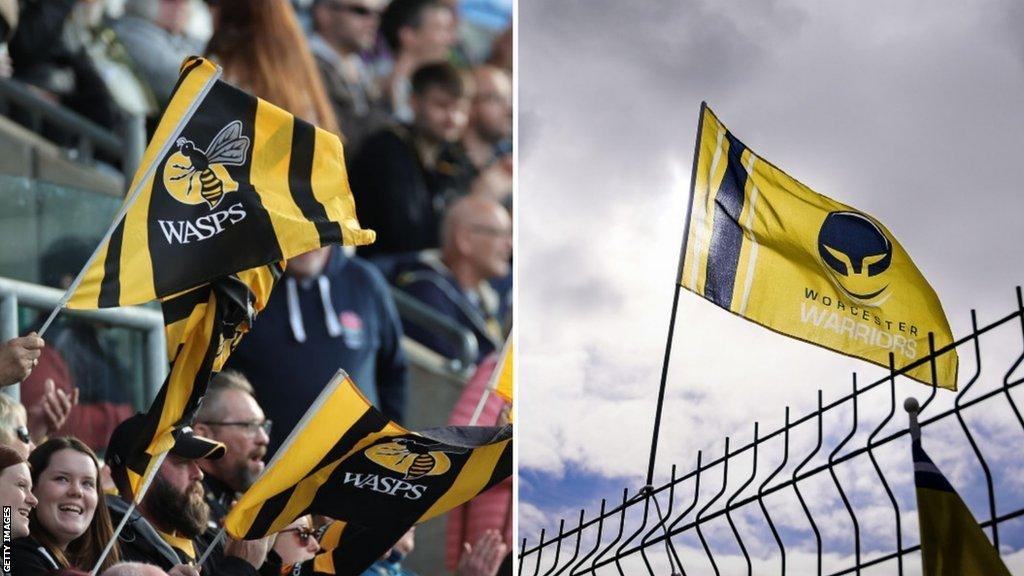Worcester Warriors and Wasps: RFU rejects clubs' appeals over Premiership relegation
- Published

Worcester were relegated from the top flight on 6 October, three weeks before Wasps
Worcester Warriors and Wasps have both had their appeals against relegation from the Premiership dismissed by the Rugby Football Union.
Under RFU regulation 5, both clubs made 'no fault insolvency' applications citing the Covid pandemic as the main reason for going into administration and being suspended from the top tier.
But the RFU's club financial viability group rejected both applications.
Those decisions have been further ratified by the RFU board.
Both clubs now have the right of appeal to an independent panel, but have also been reminded that the timeline to agree sales of the clubs is 12 December, to allow the Premiership and its 11 remaining member clubs sufficient time to plan for the 2023-24 season.
The RFU has confirmed that if the expected sales of Wasps and Worcester take place within the timeline, and rugby creditors are paid, then both clubs will begin the 2023-24 season in the Championship.
28 October - Wasps relegated from the Premiership
18 October - Huge job losses as Wasps go into administration
6 October - Worcester relegated from the Premiership
5 October - WRFC Players Ltd wound up in High Court
26 September - WRFC Trading Ltd put into administration
The applications were made by the respective administrators for both Wasps Holdings Limited and WRFC Trading Limited, the main operating entities of the respective clubs.
Wasps plan 'lacked resilience'
RFU chief executive Bill Sweeney said: "We are all deeply concerned by the insolvency of Worcester Warriors and Wasps.
"We appreciate this decision will be disappointing for the clubs and their fans, but it's clear from the club financial viability group's investigation that there were factors beyond Covid that resulted in the clubs entering insolvency.
"This has reinforced the need for greater financial transparency between clubs, Premiership Rugby and the RFU to enable both organisations to have better visibility of how these businesses are run."
The report highlighted that Wasps had shown "insufficient evidence" that there had been no fault on the part of the club or the directors or that "the financial impact of Covid was the sole reason of WHL's entry into administration".
It also said that the club's business plan "ultimately lacked resilience and could not transform what was a loss-making and debt-funded business (specifically via the retail bond issued in April 2015) into a sustainable and self-serving operation."
"The business model clearly never managed to reach the level it was intended to via the cash generation envisaged by the subsidiaries controlling the CBS Arena," it added.
"But equally the operation was immeasurably vulnerable to the lack of ability to refinance the bond, which ultimately was a key event that precipitated WHL's entry into administration."
Worcester 'perpetually funded by debt'
In Worcester's case, it was their failure to respond to His Majesty's Revenue and Customs over their ongoing tax bill that was the key factor.
"It is acknowledged that Covid did have a substantial financial effect on both WRFC Trading Limited and WRFC Players Limited," the RFU report said.
"The insolvency event in relation to WRFC Players Limited was a direct result, and the insolvency event of WRFC Trading Limited was at least indirectly a result of, winding up petitions filed by HMRC.
"These petitions resulted from a failure of the club to meet its 'time to pay' arrangements with HMRC.
"Despite several requests, the RFU has not been provided with any correspondence between the club and HMRC in relation to this. Therefore, the RFU cannot be satisfied there is no fault by the club.
"More broadly, the evidence that has been provided demonstrates a business model which did appear to be perpetually funded by debt, with no apparent attempt (except anecdotally in the last months) to execute the wider business plan and develop the land around Sixways which would have ultimately improved the chances of creating a self-sustaining model.
"While there may be a possibility that the insolvency events may not have happened were it not for the Covid pandemic, that is not the same as to say there was no fault by the club.
"The directors of the club had allowed the club to be in such a precarious position that a shock such as Covid, the challenging debt markets or another external event would have created a real and increased likelihood of an insolvency event happening."

Match of the Day Top 10: A countdown of the greatest World Cup goals
How can a manager control his emotions? Sacked in the Morning discusses anger on the sideline

Related topics
- Published25 March 2018
- Published15 February 2019
